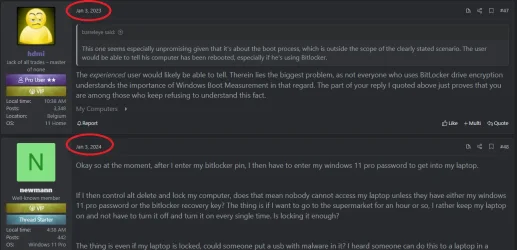I am not discussing the subject of hacking someone else's computer. Rather, I am discussing the simple fact that BitLocker Drive Encryption on editions of Windows 11 that support the feature never was designed to, by itself, be adequately secure in any way, shape or form. Its purpose is for it to be used in conjunction with a whole list of additional things like Multi-Factor Authentication (MFA) or better yet: passwordless authentication, UEFI Secure Boot, TPM 2.0, Windows Trusted Boot, Windows Measured Boot, an Anti Malware remote service, Device Health Attestation (DHA), surveillance of the physical environment, chassis intrusion detection mechanisms, and whatnot.









